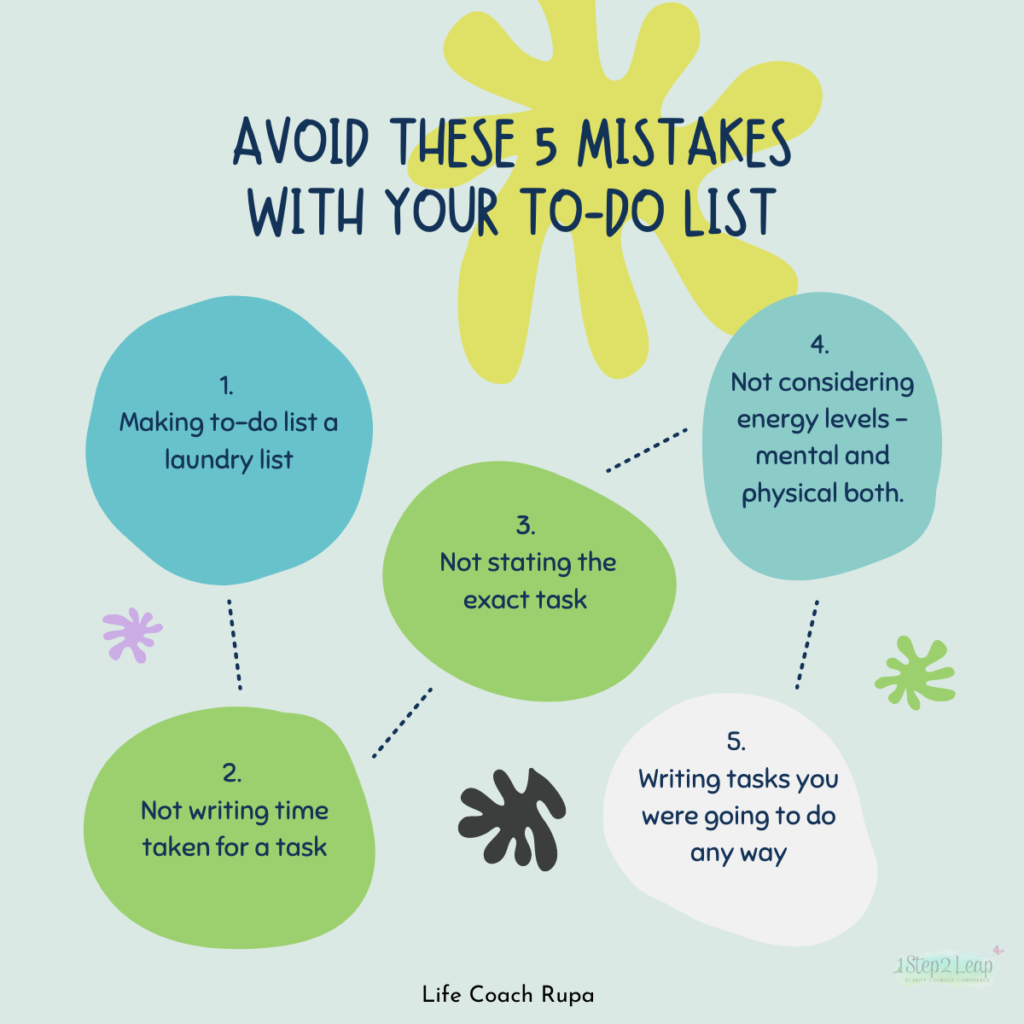Are you managing your workday well with a to-do list? Or feel the list keeps expanding mysteriously?
Do you read books; hear podcasts; watch videos and yet struggle with time management?
A to-do list offers an efficient work and time management system, if the following five mistakes are avoided:
- Making to-do list a laundry list
- Not writing time taken for a task
- Not stating the exact task
- Not considering energy levels – mental and physical both.
- Writing tasks you were going to do any way
Let’s look at each one of them in greater detail
A to-do list and laundry list are different:
A laundry list is an aid for your memory. The purpose of this list is that you don’t forget. Instead of relying on memory, you jot down on paper or an app.
For example, bedsheets need to be changed, detergent requires to be ordered, a birthday card is to be purchased, the inventory of zip-lock bags is low, the laptop has to be serviced etc.
The laundry list has no limit and keeps expanding. It’s not a pledge for action but a guarantee to remember.
A to-do list focuses on getting things done. You can build your to-do list from the laundry list. [Highly recommended!]
If you use your laundry list as the to-do list, then you are more likely to feel crushed. Despite executing several tasks, there is invariably more to be done. The satisfaction of getting things done eludes you and the frustration escalates
A to-do list comes with a time limit. With a to-do list, you intend to complete the tasks within a certain time.
Time Factor: Time available in the day and Time taken for a task
Most do not check mark their full to-do list because (1) a particular task took longer (2) unexpected events took much of the time.
A to-do list is prepared for 8 – 10 hours. Essentially, a standard workday. The problem here is, a maximum day to-do list will not allow you to accommodate any unexpected (positive or negative) event.
A to-do list should be made only for those estimates of hours where you are in complete control. It could be six hours, four hours or maybe just two hours.
If meetings are blocking about 3- 4 hours of your day, then the to-do list time should give or take not exceed 4-5 hours. You will get more done and such a system allows you to incorporate unplanned meetings and calls.
By creating time-bound to-do lists, you also learn to prioritise better.
Always write the expected time a task will take and then make a note of how much time it took. This will give you a better understanding of your time.
The other advantage of including the time factor in your to-do list is that if you have say 10 mins before lunch, you can literally knock off a task that takes 10 minutes.
A to-do list should specify the exact task to be accomplished:
A to-do list needs to be explicit. You can’t have “work on Project A”. You will keep postponing it and promptly say “I procrastinate a lot”.
Under the heading Project A, be highly specific about what you are going “to-do”. Maybe it’s an outline of the document, maybe it’s research on previous related projects or maybe it’s reaching out to an expert in the related field.
For a to-do list to work, you need to know exactly what needs to be done. Getting into the habit of writing a definitive task offers you greater clarity.
Work largely remains undone because of ambiguity. A clearly specified task will get done with more ease. Larger projects when broken into smaller and doable tasks get completed faster.
Energy Factor: Mental and Physical
There are two aspects here: physical energy and mental energy. You need adequate energy to complete your to-do list. Your to-do list should consume lesser than available energy. If your to-do lists require more energy than stock, exhaustion is inevitable.
While most estimate their physical energy accurately, most underestimate their consumption of mental energy.
A pure execution task consumes more physical energy than mental energy.
A decision-making task will consume more mental energy than physical energy. Decision fatigue is a genuine problem for many. If your to-do list comprises only decision-making tasks, you will find yourself mentally depleted.
While creating your to-do lists, ensure you consider what kind of energy the task requires and that you have the required energy to perform the task. Else you will postpone the task and as mentioned earlier, procrastination is always the easiest answer to why something was not done.
A balanced energy to-do list is recommended but life happens and on certain days you require one type of energy more than another. On such days, be very clear on how to replenish energy throughout the day.
Ordering junk food is an easy option when you are on an execution high. Au contraire ensure you are eating light digestible meals to keep your physical energy at optimal levels. Freshly squeezed lemon water triumphs caffeine!
While a daily 10 mindfulness practice is a great way to ensure your mental energy levels are optimal, a day that requires you to make more decisions than usual will need you to replenish this energy throughout the day. Keep unrequired content consumption to a minimum on such days.
Don’t write tasks you were going to do anyway
The games the mind plays.
Writing things like have a bath, have lunch, exercise, have dinner, check emails, attend meetings – are great ways to cheat your mind into thinking that you have a lot to do and you have achieved a lot by tick marking these items. Unless you suffer from severe anxiety or depression, routine tasks should not make way on your list.
The purpose of the to-do list is to consciously focus and get things done.
Habit-forming tasks should not be part of your to-do list. Keep the habit formation list separate. For example, you may be trying to form the habit of exercising and hydrating well. Keep these items on a habit formation checklist rather than making them a part of your to-do list. This way your mind is not tricked into believing that it has already achieved a lot for the day and pushes you to complete your work to-do list.

If you can work on your to-do list for these five mistakes, you will experience positive results. You will find yourself less overwhelmed, more energetic and a better sense of self. If you feel you need a further customized solution for your work and time management challenge, you can sign up for time management coaching sessions.
